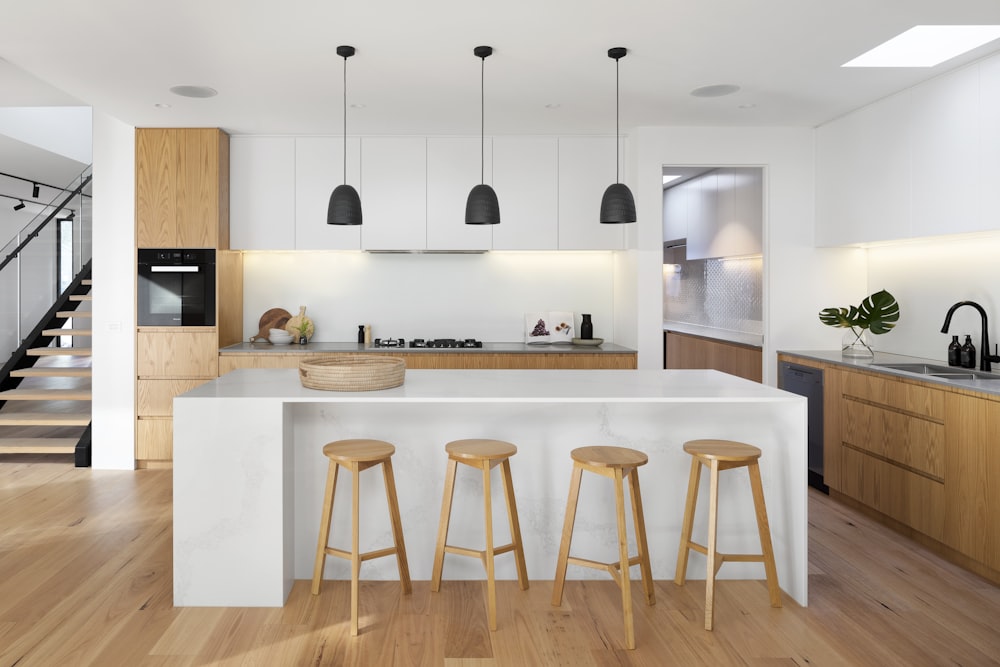Renovating your kitchen can be an exciting and rewarding project, but it's also a significant undertaking that requires careful planning and consideration. Whether you're looking to update the heart of your home for improved functionality or aesthetics, or to increase your property's value, there are several key factors to keep in mind before you embark on your kitchen renovation journey.
To help you out, we have put together a comprehensive step-by-step guide detailing everything you need to know before getting started.
Define Your Goals
Before diving into the renovation process, it's crucial to clarify your objectives and what you hope to achieve with your new kitchen. Are you primarily focused on enhancing functionality, improving aesthetics or increasing energy efficiency? Understanding your goals will help you make informed decisions about the design, materials and layout.
Establish a Realistic Budget
Another important first step in any kitchen renovation is establishing a realistic budget. This helps you set clear financial boundaries so that you don't overspend during the project.
The cost of a kitchen renovation can vary widely, depending on factors such as the size of your kitchen, the quality of materials and the complexity of the design. As a general rule though, you should aim to allocate around 10-15% of your home's value to your kitchen renovation. This can give you a ballpark figure to work with but be prepared for unexpected expenses that may arise during the project. Whether it's discovering hidden structural problems, electrical or plumbing issues or simply changing your mind about certain design elements mid-project, having that extra financial cushion can help you stay on track and avoid the stress of budget overruns.
Plan Your Layout
The layout of your kitchen plays a significant role in its functionality and efficiency. In the UK, the most common kitchen layouts are L-shaped, U-shaped and galley kitchens. Each layout has its advantages and may suit different lifestyles and kitchen sizes. Consider factors such as traffic flow, workspace and storage when designing your kitchen layout.

Obtain the Necessary Permits
In the UK, many kitchen renovations require building permits or planning permissions. Before starting your project, consult with your local council or planning authority to determine if your kitchen renovation falls under their jurisdiction. Failure to obtain the necessary permits can result in costly delays and legal complications.
Choose Quality Materials
Investing in high-quality materials for your kitchen renovation will pay off in the long run. Durable materials will not only improve the overall look of your kitchen but also increase its lifespan. In the UK, popular choices for kitchen materials include hardwoods like oak and maple for cabinets, granite or quartz for countertops and ceramic or porcelain tiles for flooring. Select materials that match your aesthetic preferences and lifestyle while staying within your budget.

Consider Energy Efficiency & Sustainability
In recent years, energy efficiency has become a significant consideration for UK homeowners. Upgrading your kitchen with energy-efficient appliances and fixtures can reduce utility bills and minimise your carbon footprint. Look for appliances with high Energy Efficiency Ratings (EER) and consider LED lighting to save on energy consumption.
Sustainability is also a growing concern for many homeowners in the UK. When renovating your kitchen, look for eco-friendly options such as recycled or sustainable materials and low VOC (volatile organic compound) finishes. These choices not only benefit the environment but can also increase the value of your home.
Focus on Storage Solutions
Effective storage solutions are crucial for maintaining an organised and clutter-free kitchen. If space is limited, consider bespoke cabinets and built-in storage options to maximise every inch of your kitchen. Pull-out pantry shelves, deep drawers and corner solutions can help you make the most of your storage space.

Ensure Proper Lighting Design
Proper lighting is essential for both functionality and aesthetics in your kitchen. Wherever possible, use windows and skylights to maximise natural lighting. For artificial lighting, consider task lighting for work areas, ambient lighting for general illumination and decorative lighting to create a welcoming atmosphere.
Create a Timeline
A well-defined timeline is crucial for managing your kitchen renovation efficiently. Be prepared for disruptions to your daily routine, as kitchen renovations can take several weeks or even months to complete. Discuss the project timeline with your contractors and make temporary arrangements for meal preparation during the renovation.
Work With Professionals
A kitchen renovation is a complex project that often requires professional help. Hiring experienced architects, designers and contractors can ensure that your project is completed to the highest standards. It's also essential to choose professionals who are familiar with UK building codes and regulations to avoid potential legal issues down the road.
Ultimately, with the right professionals and careful planning, budgeting, and decision-making you can ensure that your kitchen renovation is a success, adding both value and beauty to your home.
Tags:
Home RenovationSeptember 21, 2023





Comments